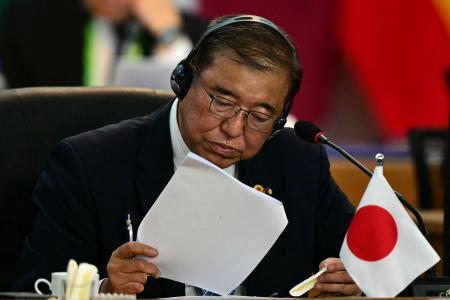
- ARAB NEWS
- 31 Jul 2025

RIO DE JANEIRO: Japanese Prime Minister Shigeru Ishiba ended his South America tour on Tuesday, highlighting certain results while leaving some challenges behind.
“I will continue to actively and ambitiously engage in summit-level diplomacy to protect peace in Japan, further ensure stability in the Indo-Pacific region, and firmly maintain a free and open international order based on the rule of law,” Ishiba said at a press conference in Rio de Janeiro on Tuesday after a series of diplomatic events.
Ishiba attended a two-day summit of the Asia-Pacific Economic Cooperation forum in Peru through Saturday and a two-day summit of the Group of 20 major economies in Brazil through Tuesday. They were his first APEC and G-20 summits since taking office last month.
In Peru, Ishiba held bilateral talks with U.S. President Joe Biden and shared the stance of continuing to strengthen the Japan-U.S. alliance. At a subsequent trilateral summit, Ishiba, Biden and South Korean President Yoon Suk-yeol agreed to continue cooperation against North Korea’s nuclear and missile development.
With these results, Ishiba planned to meet with Trump and emphasize that unity between Japan and the United States and among the two countries plus South Korea is indispensable. But the Ishiba-Trump meeting did not take place.
Ishiba tried to arrange a meeting with Trump during a stopover in the United States, but the Trump side informed Ishiba that it would be difficult. This was a miscalculation for Ishiba, who was forced to rethink his strategy for building a relationship of trust with the next U.S. president.
Meanwhile, Ishiba had a bilateral summit with Chinese President Xi Jinping on Friday, which he said was a smooth exchange of opinions. During the meeting, Xi expressed his intention to implement a bilateral agreement in September that China will ease its import ban on Japanese fishery products. The Japanese government took this remark as an achievement.
Still, Xi did not specify when China will resume imports of Japanese fishery products. There was also no concrete progress on other pending issues, including the detention of Japanese nationals in China.
During the South America tour, Ishiba held back his own diplomatic proposals, such as the establishment of an Asian version of NATO, as he did during his first foreign visit, to Laos in October, since taking office. Instead, he mentioned his priority policy of tackling Japan’s declining population at a meeting with South Korea’s Yoon, saying that he wants to deepen discussions on the issue as South Korea faces a more serious situation. At the G-20 summit, Ishiba explained his plan to create a new disaster management agency in Japan.
After returning home on Thursday Japan time, the prime minister will face the first full-scale debate with opposition parties in the upcoming extraordinary Diet session starting Nov. 28. A focal point is whether he can win the cooperation of opposition parties in drafting the government’s fiscal 2025 budget.
During his just-concluded overseas trip, Ishiba emphasized the need to communicate frequently with Xi and voiced a willingness to hold talks with Yoon at any time. However, his administration is fragile as the ruling coalition lacks a majority in the House of Representatives, the all-important lower chamber of the Diet, making it uncertain whether Ishiba will be able to carry out diplomacy as he hopes, including his first meeting with Trump.
JIJI Press